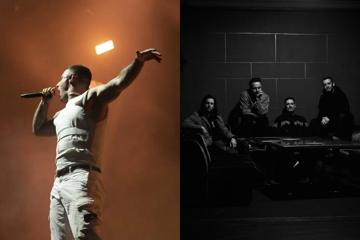Anna Karenina Takes On A 21st Century Australian Style
"Part of Anna's downfall is that she can't see outside her situation."
It's hard to miss Sarah Snook these days, which is good news for anyone who appreciates fine acting. Since her remarkable breakthrough performance opposite Ethan Hawke in the mind-bending science-fiction drama Predestination, Snook has been establishing herself as one of Australia's brightest new talents.
The last few months have seen her take on roles in projects as diverse as the family-friendly romp Oddball and the colonial era drama The Secret River. And in the coming weeks, she'll be part of the all-star Australian ensemble of The Dressmaker and appear opposite Michael Fassbender, Seth Rogen and Dressmaker co-star Kate Winslet in Steve Jobs, Danny Boyle's biopic of the controversial Apple mastermind. Before that, however, Snook has the lead role in The Beautiful Lie, the ABC's excellent six-part reimagining of Leo Tolstoy's classic novel Anna Karenina. (You know, the one that opens with "All happy families are alike; each unhappy family is unhappy in its own way.")
"It's the mark of great storytelling that you're able to push and pull the audience into areas where they may be comfortable but suddenly find themselves uncomfortable."
In refashioning the story for 21st century Australia, this contemporary take on Tolstoy's 1878 tale comes across as relevant and resonant in its exploration of a complicated web of relationships, at the heart of which is the marriage of Snook's former tennis star Anna, the wife of fellow elite athlete Xander (Rodger Corser), and the mother of a six-year-old son.
Don't miss a beat with our FREE daily newsletter
Anna's seemingly picture-perfect life falls into disarray when she plunges headlong into an impulsive, intoxicating affair with Skeet (Benedict Samuel), the fiance of her sister-in-law Kitty (Sophie Lowe). Infatuation and infidelity turn the lives of many of The Beautiful Lie's characters upside-down, with life-changing consequences for everyone involved. The complex personality of her character drew Snook to The Beautiful Lie, but what she found equally exciting and pleasing about the project was how that complexity extended to the story's ensemble of characters.
"In the book, Tolstoy presents all these different situations but then allows you to get to know the characters so intimately that you can't safely stand on one side of the fence and point the finger at the other," she says. "In the book you've seen what that person's life is like, and in the series we've created we try to make sure you know Anna truly fell in love with Skeet because you can see the love they have. You know she has left her family, and when you see the consequences of her leaving it's harder to go with her on that journey. But it's the mark of great storytelling that you're able to push and pull the audience into areas where they may be comfortable but suddenly find themselves uncomfortable."
That discomfort is especially vivid given where we find Snook's Anna at the beginning of The Beautiful Lie. While her narration speaks of darker times ahead, her relationship with her family appears rock-solid and her sense of self equally strong. For the actress, depicting Anna's journey required reserving judgement and understanding the character's state of mind.
"While you have to remain indifferent or at least outside your own judgement, you have to have a judgement because, well, you're a human being," smiles Snook. "That's what makes a person interesting: their own opinion. With Anna, I really had to silence my own opinion because it became more difficult to play her in a very present situation. Part of Anna's downfall is that she can't see outside her situation.
"Being allowed to see outside the situation as an actor meant I had to block that out so all the decisions and choices Anna made in the moment were rational in this strange place she's in. It's diminishing in a way to put it down to, say, post-natal depression or another form of depression or an accumulation of bad situations, but it is all of those things as well. When you put a label on it, it's easy to categorise and it's possible it may be solved. But by not putting a label on it, I found it easier."
"With Anna, I really had to silence my own opinion because it became more difficult to play her in a very present situation."
One of the great virtues of The Beautiful Lie is that it builds on the foundation of Tolstoy's Anna Karenina to take in the perspectives of the other characters, allowing the viewer to sympathise and empathise with a wide variety of viewpoints. Even Skeet, at first glance shallow and careless with other people's feelings, has moments of great honesty and insight.
"Of course it's important to focus on your own character's perspective, but I think in any story seeing the perspective of the other characters, how they fit into the story, informs you of yours," says Snook. "I think especially in Anna Karenina because it's about so many different types of love and so many different emotional relationships you can't help but identify with all the other characters as well.
"There are relationships you have in your teens and your early 20s where you have an idea of what real romantic love is, what that is meant is be — that kind of storybook narrative — and I think people follow that, maybe even unintentionally. That idea is interesting to me, and I think it's resonant for Anna because she may have been pushed into things that as an older woman she may never have done.
"She was never unwillingly pushed into things or places but she perhaps made decisions based on what was easy or what was present at the time rather than step back and make difficult decisions. In this story, she makes a difficult decision for the first time… and it's not one that's going to shape her life the way she wants it."







